29 feb 2020
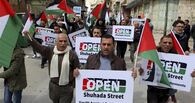
The Israeli occupation forces (IOF) on Friday violently suppressed a peaceful Palestinian march staged in the central area of al-Khalil city to mark the 26 anniversary of the Ibrahimi Mosque massacre and to condemn Israel’s ongoing crimes against the Palestinian people.
According to local sources, Israeli soldiers showered the participants with stun and tear gas canisters and physically assaulted many of them. video video
The protesters marched to al-Shuhada street, which has been closed since the 1994 massacre that was committed by a Jewish terrorist at the Ibrahimi Mosque in the Old City of al-Khalil.
They carried Palestinian flags and placards demanding the Israeli occupation to reopen the street and denouncing the US deal of the century and Israel’s crimes and settlement activities in the Old City of al-Khalil.
According to local sources, Israeli soldiers showered the participants with stun and tear gas canisters and physically assaulted many of them. video video
The protesters marched to al-Shuhada street, which has been closed since the 1994 massacre that was committed by a Jewish terrorist at the Ibrahimi Mosque in the Old City of al-Khalil.
They carried Palestinian flags and placards demanding the Israeli occupation to reopen the street and denouncing the US deal of the century and Israel’s crimes and settlement activities in the Old City of al-Khalil.
25 feb 2020
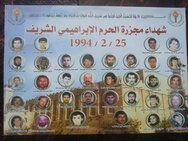
Twenty-six years ago, on February 25, 1994, Jewish settler Baruch Goldstein, an American-Israeli physician, opened fire at hundreds of Muslims who were performing the dawn prayer on a Ramadan day at the Ibrahimi Mosque in southern West Bank city of Hebron (Al-Khalil).
After several minutes of shooting, 29 worshippers were killed and hundreds of others were wounded before people were able to overcome the murderer and end his life. tweet
On that very same day, Israeli soldiers killed an additional 21 Palestinians who took to the streets in the occupied territories to protest the massacre in Hebron. tweet
Instead of taking action against the extremist Jewish settlers living in the occupied Palestinian town of Hebron, particularly in the illegal settlement of Kiryat Arba, where Goldstein used to live, the Israeli authorities punished the Palestinians.
After the massacre, the Israeli military divided the Ibrahimi mosque into two sectors: Jewish settlers and visitors have exclusive access to more than half of the site, including all of the surrounding gardens.
Hebron city center is the site of several illegal Jewish settlements.
According to the Israeli human rights group B’tselem, in Hebron “Palestinians living in the area are subjected to extreme restrictions on their movement by car or on foot – including the closure of main streets – while settlers are free to go where they wish.” tweet
After several minutes of shooting, 29 worshippers were killed and hundreds of others were wounded before people were able to overcome the murderer and end his life. tweet
On that very same day, Israeli soldiers killed an additional 21 Palestinians who took to the streets in the occupied territories to protest the massacre in Hebron. tweet
Instead of taking action against the extremist Jewish settlers living in the occupied Palestinian town of Hebron, particularly in the illegal settlement of Kiryat Arba, where Goldstein used to live, the Israeli authorities punished the Palestinians.
After the massacre, the Israeli military divided the Ibrahimi mosque into two sectors: Jewish settlers and visitors have exclusive access to more than half of the site, including all of the surrounding gardens.
Hebron city center is the site of several illegal Jewish settlements.
According to the Israeli human rights group B’tselem, in Hebron “Palestinians living in the area are subjected to extreme restrictions on their movement by car or on foot – including the closure of main streets – while settlers are free to go where they wish.” tweet
|
|
Twenty-six years ago, on February 25, 1994, a Jewish settler named Baruch Goldstein, an Israeli army physician, opened indiscriminate fire from his army-issued automatic rifle at hundreds of Muslims as they were performing the dawn prayer on a Ramadan day at the Ibrahimi Mosque in southern West Bank city of Hebron.
After several minutes of shooting, 29 worshippers were killed and 150 others were wounded before people were able to overcome the murderer and end his life. As if this was not enough, Israeli soldiers on that day killed an additional 21 Palestinians who took to the streets in the occupied territories to protest the massacre in Hebron. |
Instead of taking action against the extremist settlers in Hebron, particularly in the illegal Kiryat Arba settlement in Hebron where Goldstein lives, by removing them from Hebron, the Israeli authorities punished the victims, the Palestinians.
The mosque was closed for six months after the incident to be opened divided between Muslims and Jews when for centuries it was a purely Muslim worship place.
At the same time, Palestinians in areas in the heart of Hebron where settlers had set up illegal bases were restricted in movement and shops were forced to shut down. Entire streets became off to Palestinians where Jewish settlers were allowed to roam them freely and under heavy army protection.
This situation is continuing until today, and it has even become worse.
|Remembering the Ibrahimi Mosque Massacre| International Solidarity Movement (ISM)
The mosque was closed for six months after the incident to be opened divided between Muslims and Jews when for centuries it was a purely Muslim worship place.
At the same time, Palestinians in areas in the heart of Hebron where settlers had set up illegal bases were restricted in movement and shops were forced to shut down. Entire streets became off to Palestinians where Jewish settlers were allowed to roam them freely and under heavy army protection.
This situation is continuing until today, and it has even become worse.
|Remembering the Ibrahimi Mosque Massacre| International Solidarity Movement (ISM)
3 dec 2019
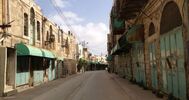
The Israeli occupation army has verbally ordered a Palestinian storeowner to close the doors of his business near the Ibrahimi Mosque in the Old City of al-Khalil as a prelude to carrying out its plan to build a Jewish settler neighborhood in the area.
According to local sources, Israeli soldiers ordered the storeowner to shut down his store permanently as part of a plan to seize scores of homes and stores near the Ibrahimi Mosque and the central wholesale market in al-Shuhada street in order to build a neighborhood for Jewish settlers.
Israeli war minister Naftali Bennett on Sunday announced his intent to build a new Jewish-only settlement in the vicinity of the Ibrahimi Mosque and in the wholesale market street.
The market area is on al-Khalil’s once-bustling Shuhada Street, which leads to the Islamic holy site, the Ibrahimi Mosque.
The street is now largely closed off to Palestinians, who have long demanded that it be reopened. The Israeli army closed this street with its homes and stores after one of the extremist Jewish settlers committed a massacre against Muslim worshipers at the Ibrahimi Mosque in 1994.
According to local sources, Israeli soldiers ordered the storeowner to shut down his store permanently as part of a plan to seize scores of homes and stores near the Ibrahimi Mosque and the central wholesale market in al-Shuhada street in order to build a neighborhood for Jewish settlers.
Israeli war minister Naftali Bennett on Sunday announced his intent to build a new Jewish-only settlement in the vicinity of the Ibrahimi Mosque and in the wholesale market street.
The market area is on al-Khalil’s once-bustling Shuhada Street, which leads to the Islamic holy site, the Ibrahimi Mosque.
The street is now largely closed off to Palestinians, who have long demanded that it be reopened. The Israeli army closed this street with its homes and stores after one of the extremist Jewish settlers committed a massacre against Muslim worshipers at the Ibrahimi Mosque in 1994.
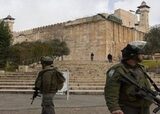
The Israeli Channel 7 unveiled an Israeli plan, on Monday, to make additions inside the Ibrahimi Mosque in the center of Hebron, the Palestine News Network reported.
The project, worth approximately 500,000 shekels (NIS), includes designing an elevator among other additions, exclusively for the use of illegal Israeli settlers.
Israel’s Coordinator of the Territory Affairs, Kamil Abu Rokon, sent a letter to the Hebron municipality months ago asking them to ratify the work, telling them that the rejection of this project would mean putting the military hand on the area and carry out repair work unilaterally.”
The Hebrew channel explained that the responsibility of the area of the Ibrahimi Mosque follows the Islamic endowments in Hebron, based on the Hebron agreement, but that if the municipality rejects the project will be implemented in spite of them.
The occupation authorities are accelerating the pace of annexing large parts of Hebron, especially in the central area where the old city is located.
According to B’Tselem, 700 illegal Israeli settlers live in Israeli controlled H2, among 34,000 Palestinians, while 622,670 settlers live throughout the occupied West Bank.
The project, worth approximately 500,000 shekels (NIS), includes designing an elevator among other additions, exclusively for the use of illegal Israeli settlers.
Israel’s Coordinator of the Territory Affairs, Kamil Abu Rokon, sent a letter to the Hebron municipality months ago asking them to ratify the work, telling them that the rejection of this project would mean putting the military hand on the area and carry out repair work unilaterally.”
The Hebrew channel explained that the responsibility of the area of the Ibrahimi Mosque follows the Islamic endowments in Hebron, based on the Hebron agreement, but that if the municipality rejects the project will be implemented in spite of them.
The occupation authorities are accelerating the pace of annexing large parts of Hebron, especially in the central area where the old city is located.
According to B’Tselem, 700 illegal Israeli settlers live in Israeli controlled H2, among 34,000 Palestinians, while 622,670 settlers live throughout the occupied West Bank.
5 aug 2019
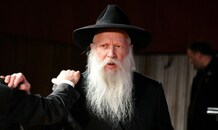
The Israeli government intends to honor an extremist rabbi who has applauded the killing of non-Jews, especially the Muslims and Palestinians.
According to Haaretz newspaper, education minister Rabbi Rafi Peretz and transportation minister Bezalel Smotrich will honor rabbi Yitzchak Ginsburgh, who praised the 1994 massacre in al-Khalil city and was previously charged with inciting racism.
The ministers will speak at a Thursday event during which a prize will be awarded to Ginsburgh.
The US-born rabbi is known for publishing a pamphlet praising the actions of terrorist Baruch Goldstein, who in 1994 carried out the massacre at the Ibrahimi Mosque, in which he killed 29 Muslims and injured dozens as they were praying.
Ginsburgh is also among the rabbis who endorsed the book “The King’s Torah,” which discusses circumstances in which Jews may kill non-Jews according to Jewish law.
The prize will be awarded under the auspices of an institution called the “Cathedra for Torah and Wisdom,” which receive financial support from the education ministry’s department for Jewish culture.
According to Haaretz newspaper, education minister Rabbi Rafi Peretz and transportation minister Bezalel Smotrich will honor rabbi Yitzchak Ginsburgh, who praised the 1994 massacre in al-Khalil city and was previously charged with inciting racism.
The ministers will speak at a Thursday event during which a prize will be awarded to Ginsburgh.
The US-born rabbi is known for publishing a pamphlet praising the actions of terrorist Baruch Goldstein, who in 1994 carried out the massacre at the Ibrahimi Mosque, in which he killed 29 Muslims and injured dozens as they were praying.
Ginsburgh is also among the rabbis who endorsed the book “The King’s Torah,” which discusses circumstances in which Jews may kill non-Jews according to Jewish law.
The prize will be awarded under the auspices of an institution called the “Cathedra for Torah and Wisdom,” which receive financial support from the education ministry’s department for Jewish culture.
